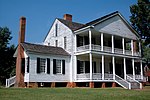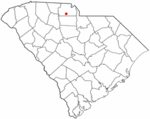Hightower Hall
Historic house museums in South CarolinaHouses completed in 1853Houses in York County, South CarolinaHouses on the National Register of Historic Places in South CarolinaItalianate architecture in South Carolina ... and 4 more
Midlands South Carolina Registered Historic Place stubsMuseums in York County, South CarolinaNational Register of Historic Places in York County, South CarolinaSlave cabins and quarters in the United States

Hightower Hall (Forrest Hall) is a historic home located near McConnells, York County, South Carolina. Completed in 1856, Hightower Hall is a two-story, weatherboarded frame dwelling in a vernacular interpretation of the Italianate style. The front facade features a prominent three-story tower that rises ten feet above the main roof of the house. It also has a low-pitched roof, deep eaves, decorative brackets and verandahs. Also on the property are two barns and two slave cabins.
Excerpt from the Wikipedia article Hightower Hall (License: CC BY-SA 3.0, Authors, Images).Hightower Hall
Bookout Road,
Geographical coordinates (GPS) Address Nearby Places Show on map
Geographical coordinates (GPS)
| Latitude | Longitude |
|---|---|
| N 34.881111111111 ° | E -81.181388888889 ° |
Address
Bookout Road
Bookout Road
29726
South Carolina, United States
Open on Google Maps





